Our current cultural moment has provoked an unprecedented excavation of the female memory. Recollections of violations large and small, thoroughly traumatizing and mildly annoying, top-of-mind and all but forgotten, have poured onto the internet like a million leaks from an ancient, overfilled vessel. Many have seen themselves in the stories of alleged abuse by Harvey Weinstein, Louis C.K., Brett Ratner, John Besh, James Toback, Jesse Lacey, or any of the dozens of other men who’ve been accused of sexual exploitation in recent weeks. Some of these women had already recognized certain incidents from their past as harassment or abuse. Others have been forced by this interminable news cycle to relive, reconsider, and reclassify some of the things men have done to them against their will or to search for boundaries in the mess of human interaction.
To anyone bearing witness, #MeToo is writing an alternate history of the workplace, the classroom, the corner store, the dance club, the sidewalk, the friend’s party, and the intimate confines of the romantic relationship. To people who’ve experienced harassment and abuse, it’s also an alternate history of our own lives. Before, we were everyday women dealing with everyday creeps. Now, we must contend with the knowledge that the everyday woman, by virtue of existing in the public sphere, has endured untold violations. Actions that once seemed playful or relatively harmless now seem sinister, invisible grease for the wheels of an orchestrated system of humiliation designed to instill self-doubt and fear into women who might have otherwise posed a threat to male control. “What happened to me was something that was so casual, I almost didn’t even consider it sexual harassment, even though it was beyond my desire,” wrote the Root’s Danielle Young in a recent piece about the moment the Rev. Jesse Jackson grabbed her thigh during a photo-op.
Of course, not every uncomfortable experience is harassment, and not every woman is redefining these experiences as abuse. Though the lines between acceptable behavior and harassment feel in some ways clearer today than ever, there still isn’t anything close to broad agreement about where all these lines should be drawn.
This is why the current moment has both women and men reassessing interactions from their past, wondering if they were on either end of a troubling encounter. It’s not just that our collective understanding of the prevalence of harassment has changed; it’s that our understanding of the very definition of harassment has been called into question. The definition will grow more capacious as we retrain our antennae to categorize certain male behavior as threatening that we’d previously been conditioned to dismiss or ignore. Both the #MeToo hashtag and the “Shitty Media Men” spreadsheet place accounts of one-off verbal come-ons next to dire accusations of sustained sexual abuse, which made some feminist critics (including, when the spreadsheet first circulated, me) queasy. As Rebecca Traister wrote in New York magazine last week, “the rage that many of us are feeling doesn’t necessarily correspond with the severity of the trespass: Lots of us are on some level as incensed about the guy who looked down our shirt at a company retreat as we are about Weinstein. … Part of it is the decades we’ve spent being pressured to underreact.”
The specter of sexual harassment has been weighing heavily on many of the men in my life. Male friends have contacted me out of the blue to ask me to be honest, to tell them if I think they’ve ever done anything to earn them a spot on one of the many semi-secret lists of sexists and creeps bouncing around the internet. When I told a Lyft driver in Detroit that I was in town for the Women’s Convention in late October, he asked if I was “a #MeToo,” too. A friend’s father, who I’ve known for years and hugged at least a dozen times, paused and asked for consent before putting an arm around me at a party this month. “It’s just—you never know how people will feel about being touched these days,” he said with a laugh.
By legal definition, sexual harassment is unwelcome or unwanted; if it’s welcome or wanted, it’s not harassment. The baked-in subjectivity of this definition, combined with the large-scale recalibration of this moment, has allowed space for some people to wonder whether cracking down on sexual harassment will put an end to all friendly flirtation. One male director of a design firm told the New York Times that companies should “cancel the holiday party” until, as the Times paraphrased, “it has been figured out how men and women should interact.”
But the rules of interaction haven’t changed—it’s just that, for the first time, women are publicly calling foul en masse. Sexual harassment has moved from the realm of cheesy office training videos to the real world, where harassers are not only Donald Trumps and anonymous subway masturbators, but also our friends, lovers, fathers, and work buddies. They’re the bad guys, yes, and they’re a fair number of “good guys,” too. If men are worried that they are constantly on the verge of unwittingly violating someone in the post-#MeToo era—which, good, they should be—it’s because, in a society that rarely takes claims of clear-cut sexual assault seriously, there’s usually little room for open discussion about the more nuanced social norms that define the boundaries of sexual harassment.
Now there’s finally room. Room for survivors to dig up and display the rotting garbage they’ve been toting around for years, to explain aloud, for the whole world to hear, where they draw the line between right and wrong. To get a handle on how people define, or are redefining, the borders of sexual misconduct, Slate distributed a survey asking people a series of questions about their experiences as targets or perpetrators. We solicited anecdotes about encounters that didn’t seem like harassment at the time but upon later reflection looked like more serious transgressions. We also asked our respondents to offer examples of incidents that, for them, fell into a “gray area”—a category of behavior that isn’t unequivocally harassment, whether because of the intent of the perpetrator, the reception of the target, or the severity of the offense. They classified each anecdote as “in a gray area but ultimately OK” or “in a gray area but ultimately not OK.”
There are a few visible patterns in the stories from our 56 respondents. People who felt flattered as teenagers or young adults by sexual advances from older authority figures grew to see such pursuits as “gross” or an abuse of power as they aged. Survivors of verbal harassment were sometimes wary of naming it as such if it never escalated into anything physical. Both male and female victims reported feeling pressure to be “chill” when physical touch or sex acts were forced on them. Women are reconsidering sexual contact they’ve had with gay men—both as targets and culprits of misconduct—and contemplating when a compliment becomes street harassment. To these survey respondents, sexual violations in the context of romantic relationships have been some of the hardest examples to recognize as assault in the moment, but they’ve also done some of the deepest and most lasting damage to both survivor and perpetrator.
The variety of behaviors people corralled into the two gray areas identified here—“borderline but ultimately OK” and “borderline but ultimately not OK”—is telling, too. What seems like a gray area to one person is outright harassment to another. Many of the anecdotes that respondents described, especially those that involved unwanted physical touch, could easily be filed under the graver labels of sexual abuse or assault. The diversity of reactions to similar behaviors reveals both the personal nature of these experiences and a widespread lack of practical know-how when it comes to recognizing sexual harassment in the real world. It also illustrates how difficult it can be to attach any of these labels—harassment, assault, coercion, abuse—to people we know, trust, or love, or to ourselves, even when they might seem to objectively apply.
These stories, which have been lightly edited for clarity, are not presented to caution readers about any sort of slippery slope about naming harassment or to argue that the borders of harassment are hopelessly blurry. They’re not: If people paid closer attention to, and heeded, the desires of their sexual partners and women in general, there would surely be far fewer unwanted advances. Instead, we hope the following anecdotes will illustrate the diversity of human reactions to one set of similar behaviors and the barriers that prevent people from recognizing harassment when it happens to them—or when they perpetrate it against someone else. Those perceptions will continue to shift as people absorb the mass of new data points that we’re currently sifting through as a culture. If we can subject the nuances of the gray areas to close examination instead of running away from them, that shift might become a sea change.
At Work
Harassment is perhaps easiest to identify when it occurs in the workplace. There are laws on the books defining and prohibiting it; since the 1990s, most companies have set policies about it. But Slate’s respondents were split on certain specific actions—discussing an employee’s appearance, hugging subordinates, making weird comments about a worker’s pregnancy—and there are still barriers to recognizing textbook harassment when it happens, many of which are represented in the stories below. Young people often don’t have the confidence or institutional experience to know when managers cross lines, and many employees subconsciously make excuses for inappropriate behavior to avoid confrontation or being disillusioned by mentors.
Describe a situation that was in a gray area but ultimately OK.
When I was around 30, I lived in Hong Kong and worked as a reporter. I frequently interviewed highly successful business people. It wasn’t uncommon for men I interviewed to be keenly aware that I didn’t have kids, went out a lot, and basically didn’t conform to feminine norms. They would invite me to visit them at their “second home” in Shanghai or to go to Macau for the weekend to gamble with them. One guy … would send six- or seven-dozen roses to my desk at the paper for seemingly no reason at all. … There did seem to be an awareness to not physically threaten or touch me. Moreover, their gestures were more romantic in nature verses crude. I actually believe that these advances were really a form of wooing me to become their mistress, which is not generally unusual for men of that level of success to have in Asia. —L., 39, consultant, Houston
I was an intern on Capitol Hill when I was 19. I eventually learned that all of the interns had nicknames among the staff, and my nickname was “hot-tern.” … I honestly thought it was hilarious when I found out and most importantly, I never felt disrespected by any of the staff or held back from any experiences because they weren’t taking me seriously or anything of the like. —Alycia, 30, finance professional, Boston
I was pregnant but hadn’t told anyone. My male boss brought me into his office to ask if I had anything to tell him because my boobs seemed much larger than usual. —Elise, 47, lawyer, New York
[I have] an older colleague who works in a different office. When he visits he gives me a hug, and I find it friendly and fatherly, but another of my colleagues has told me she would not like that (he hasn’t hugged her, so maybe he accurately reads the room). —Emma, 36, charity grant assessor, United Kingdom
Hanging out with someone from work at a bar when he lunged forward and stuck his tongue down my throat. I made several excuses to leave, but he insisted on walking me home. I didn’t think it was a date, but I could see how he might read the situation as such. I told him the next week that I wasn’t interested, and he was very nice about it, but I felt uncomfortable at work after that. I don’t blame that on him, though. —Sharon, 24, assistant, New York
My boss discussing blow jobs in front of or with me, in vague terms. —Vivi, 30, analyst, Idaho
I used to have a male colleague who would use penis analogies to discuss completely nonsexual things. If a politician self-sabotaged, my colleague would say “so-and-so tied a brick to his dick and stuck it off the edge of a bridge.” If two people were fighting on Twitter, my colleague would say they were “measuring their dicks against one another.” It wasn’t exactly harassment, but it made me uncomfortable—like, why is he making me think about penises in the middle of my workday when penises are absolutely not germane to what we’re discussing? I ultimately found it OK, though, because he wasn’t targeting me specifically and never talked about his colleagues’ genitals. —Natasha, 29, journalist, D.C.
Describe a situation that was in a gray area but ultimately not OK.
[A much older manager] would often talk about how “cute” I was and was fixated on my love life. He always wanted details about the guy I was dating. At the time I just thought he was a silly, older man. Looking back on it, I realize now that it was the buildup to when he pinned me against a counter with his boner. —Lauren, 39, consultant, Houston
My husband and I were both sent on a company trip to France. I got pregnant while on the trip. My male boss said, “I knew if we sent you on a trip like that you would end up pregnant.” To this day I still want to defend myself by saying, “But I am going on maternity leave and will come back to work,” like I need to justify my behavior. —Madeleine, 61, retired, Redmond, Washington
I had a temporary Christmas job in retail. When I was stocking the shelves an older woman would come up behind me and … press herself against me. She had worked there a long time, and I was new, so I would not have been taken seriously if I had complained. Also people didn’t have a conception of her as being a sexual person at all, let alone attracted to women. —Emma, 36, charity grant assessor, United Kingdom
In the restaurant world: I was told I was hired because the manager likes “cute” girls. A different restaurant manager laughed with me privately about a chef who was being reprimanded (lightly) for sexual harassment, and chef said, “But that’s why we work in restaurants! Because we can say and do those things, and it’s OK!” The manager expected me to laugh? I even might have. —Cora, 29, copywriter, D.C.
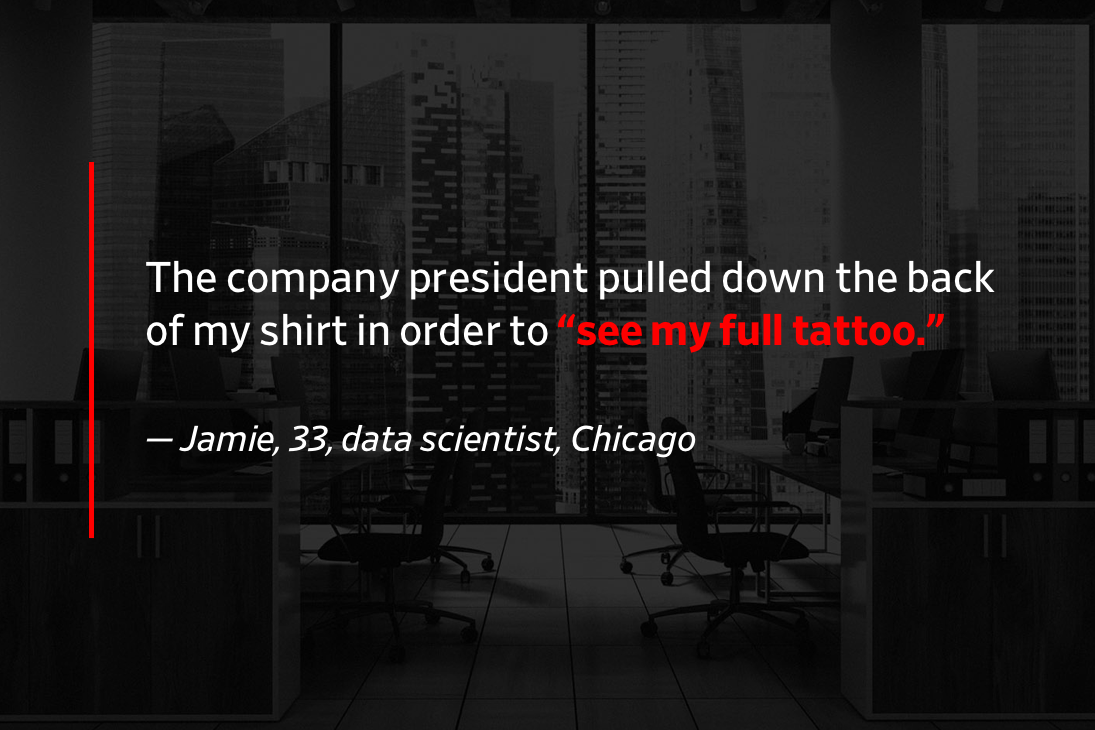
At my grad school internship, I worked at a small think tank. I have a tattoo on my back and was wearing a shirt that mostly covered it but there was a bit peeking out. The company president walked up behind me and pulled down the back of my shirt in order to “see my full tattoo.” —Jamie, 33, data scientist, Chicago
I was in the first year of my first job out of college at age 22. I was on a work trip with basically all my co-workers, and it was very late (maybe 3 a.m.) after a fancy event we were all staffing. We were drunk and giddy and sharing a bottle of prosecco in an empty hotel ballroom. One older married guy (far higher up the professional ladder than me, but not in my direct chain of command) was talking and flirting with me. When the group finally dispersed, the man asked me if I wanted to see his room, since it was much bigger and nicer than mine. I did, and we hung out for another hour or two while he packed for his early morning flight. Nothing happened, and when he left for his flight at 6 a.m., we parted ways. But I always thought it was weird that an older married dude invited a very young subordinate to his hotel room at 4 a.m. after flirting with her. I think it made him feel good just to prove to himself that he could get a 22-year-old to come back his hotel room or something. I always felt weird around him after that and lost a lot of respect for him, even though at the time, it made me feel flattered to have been “chosen.” —Natasha, 29, journalist, D.C.
Describe a situation that seemed OK at the time but now seems like harassment.
When I was in college, I worked part-time in a local restaurant. My boss would make frequent remarks about my physique. At the time, and considering how hard I would train, I thought it was a compliment that he thought I had a “tight little body.” … I realize now that he was assessing my body, similar to how I would imagine people talk about racehorses or a well-bred dog. —Lauren, 39, consultant, Houston
When I was 20 years old at my first job of less than a year, my co-worker told me that our 70-year-old boss had been commenting on the size of my breasts and laughing about what a nice rack I have. The same co-worker later told me about a sex dream he had about me. I thought these things were funny at the time and laughed them off, but they’ve always stuck with me. —Julia, 30, administrative professional, Philadelphia
When I was 18 … my job consisted of organizing, retrieving, and delivering records to the hundreds of attorneys in the building. One attorney started personally requesting me to be the one to bring him his files. Eventually, one day when I brought him his files, he came right up and hugged me, saying, “We know each other well enough. We can hug.” Then he would email me to ask if I wanted to watch movies at his place. I could “borrow a pair of pajamas from him” if I wanted. I declined, not knowing what to do, even rationalizing it with odd things like “maybe he’s gay and just legit wants a girlfriends pajama party?” At the time I was 18 and didn’t know what was normal, but now as a 30-year-old woman, I look back and see a man in his 40s trying to have a sleepover with an 18-year-old intern. —Alycia, 30, finance professional, Boston
1973, job interview in a hotel room with a group of men. One invited me to come down to the newsstand with him to buy cigarettes. I ended up in his hotel room where I gave him consensual oral sex. I got the job. —Sandra, 71, retired college professor, New York
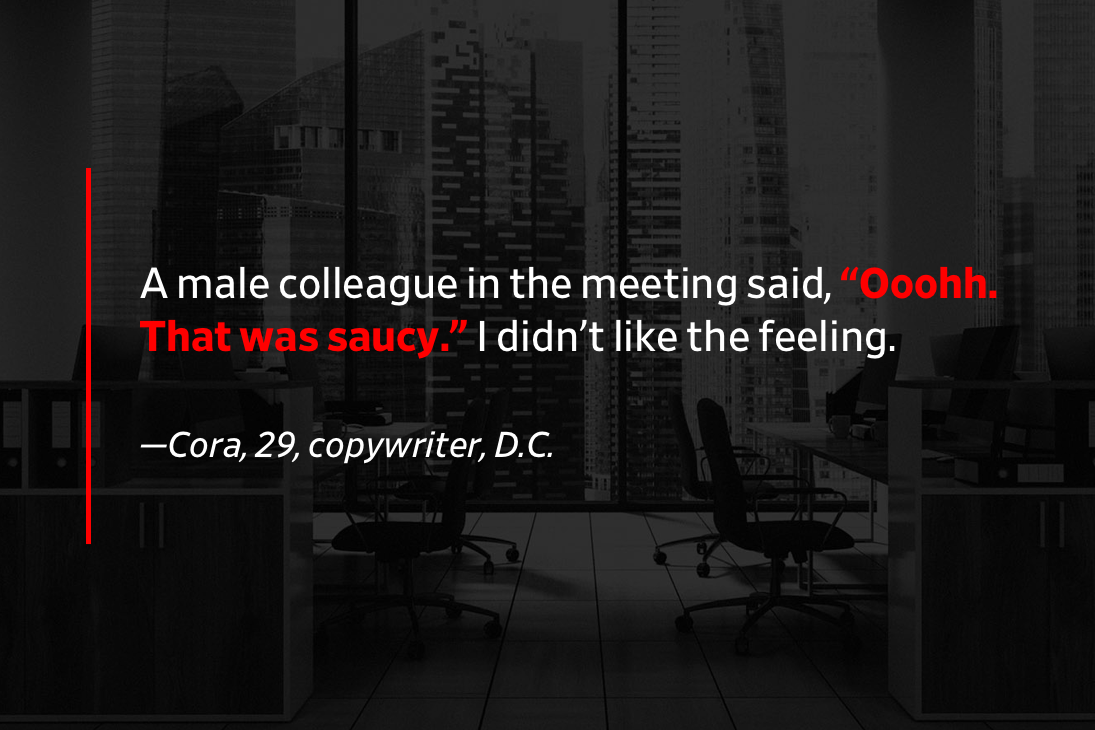
At work, I explained to a new team member the history of a client. I said, “This is a new client that we recently brought in—well, actually I brought them in,” because I did. The other colleague in the meeting, male, said, “Ooohh. That was saucy.” I didn’t like the feeling at the time, but the more I thought about it, the more I realized he would never have said that to a man, and saucy has very sexual connotations. —Cora, 29, copywriter, D.C.
When I was a teenager, I worked at a small bar and grill. In the kitchen, most nights, it was just me and the chef. The chef never really creeped me out, but he hugged me a lot and would run his hands along my waist and ribs, and he would kiss my neck. Looking back on it, I can see that it was completely inappropriate (given that I was 15-22 years old while holding this job and that he was 25 years my senior), though I don’t really feel traumatized by it. I actually kind of liked the attention as an insecure teenage girl. —Lindsay, 35, higher education, Wisconsin
A couple months after graduating college, I was starting my first job with a consulting company. They had gathered all the new analysts from around country in a hotel in Dallas. There were a number of social engagements that you were kind of expected to go to, and there’s a lot of drinking. A couple nights in, I went to the restroom and was standing at a urinal. Someone comes up next to me, and I know he’s a manager because they wear different nametags. He glances over at me, ostensibly looking at my penis, and he makes this comment about me having a tiny white dick and that it didn’t measure up at all to his dick, which he described as so low it was hanging into the urinal. [At the time], I think I was thinking of it like, “Oh, it’s just guys saying shit to each other when they’re drunk.” —Ben, 32, Oakland
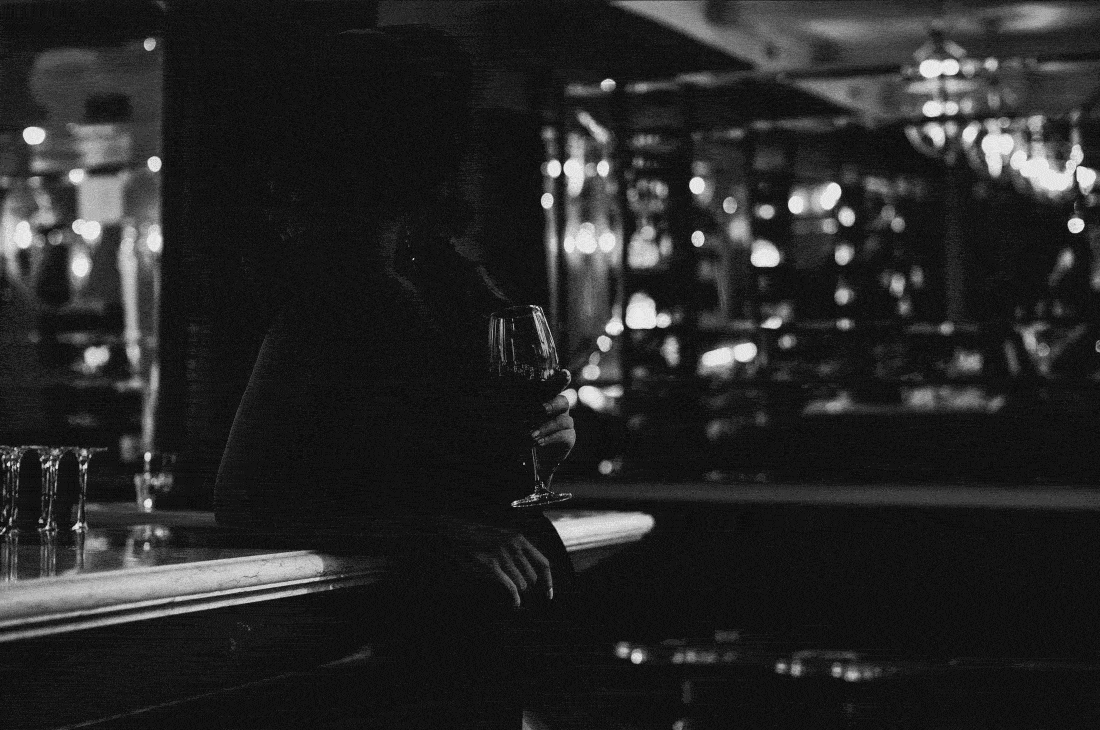
Dating
When physical intimacy or mutual romantic interest has already been established, it can be especially hard to entertain the possibility that a sexual experience, in that context, might constitute harassment. Also, the legacy of woman as property and sex as her duty creeps into contemporary relationships in insidious ways, sometimes in the form of relentless pestering for sex or willful disregard for a partner’s desires. These anecdotes show that, in cases where there is romantic or sexual history between the partners, recognizing misconduct by either party can be incredibly painful.
Describe a situation that was in a gray area but ultimately OK.
I once was in a relationship with a woman who clearly saw me as a long-term partner, when I considered us to be less serious. I never misrepresented my feelings about us out loud, but whenever she would bring it up I would dodge the question. I didn’t want us to break up and stop having sex, so I let her continue to believe that we might be long-term partners. I think I could have acted in a way that was more considerate of her feelings and lessened the eventual emotional hardship she suffered when we broke up, but I don’t believe what I did was sexual harassment. —Roger, 29, lawyer, D.C.
Describe a situation that was in a gray area but ultimately not OK.
I’ve had many experiences of men with whom I was intimate having an expectation of “getting off” or finishing even if we were not having sex. I’ve been yelled at for giving a guy “blue balls.” I’ve had many experiences where I was intimate with a man and then slowed down before anything moved toward intercourse, and I’ve received a lot of “well, you implied that we were going to have sex” or “now I’m worked up, and it causes me pain if I don’t get off” or “why would you invite me over if you weren’t planning on having sex with me?” I have many times finished a guy (hand job usually) even if we were done “hooking up” because I didn’t want to have sex but he implied that I “owed him that.” I still find it horrifying and inappropriate, but whenever I’m in that situation, I still feel obligated to do it. —Keisha, 23, graduate student and State Department employee, D.C.
There was a time in college where I felt a lot of pressure around fitting in, particularly with other men, particularly straight men, and sort of the culture of hooking up that I felt was floating around in my social circles. I hooked up with someone. She and I had met at a party, and we had both been drinking. We were making out, and we were talking, so I felt like it was a situation where we were both present for it and that it was consensual. But I saw her a few days later, and I’d left some hickeys on her shoulder and her neck. She wasn’t upset by it and kind of laughed about it as a sort of joke. But it’s a memory I look back on, and I don’t feel good about, in part because I felt like the whole point of the hookup was me sort of trying to prove something or had a connection to my own insecurity. —Ben, 32, Oakland
My first girlfriend would allow me to hide in her room at night after I became homeless at 18. We were very sexually active during the beginning of our relationship, but near the end she wanted to slow down. I didn’t want to and continued to make advances consistently. I thought at the time that since we were in a relationship it was OK. I allowed myself to stay ignorant until after we had broken up and I read some of the blog posts that she wrote about that time in her life. The way she described how she felt used, harassed, and worthless after my consistent advances tore me apart. —Roy, 28, musician and activist, Salt Lake City
I was with a man who resisted condom use with such intensity that eventually I gave up on the idea of using them. We started using the withdrawal method. One day, he unilaterally decided that if we were having sex for the second time in a day that it was OK not to withdraw, because his friend had told him so. I’d told him so many times that we were risking an unwanted pregnancy, and he would just brush aside all my concerns as if I were being hysterical or paranoid. So some part of me just gave up in that moment, lying there in bed feeling helpless, feeling as if my body wasn’t really my own, as if what I needed or wanted wasn’t even a part of the equation. Unsurprisingly, I got pregnant, and went through the seven most miserable weeks of my life waiting to get an abortion. It was one of the most awful things I’ve ever gone through, and it’s so depressing that I valued myself so little. —Yosia, 31, business owner and writer, California
Describe a situation that seemed OK at the time but now seems like harassment.
I was at a local show and ended up getting [a woman’s] phone number. A while later we went out to dinner and went back to her house to watch a movie. There was some intoxication involved. She asked if I wanted to go to her room for the night. At the time I didn’t feel the desire to go any further than that and didn’t make any advances. After we began [having sex] she [said] she didn’t know if she was clean and that she didn’t have protection, but by that point I wasn’t in a mind frame to consider the consequences. After the first round there was a small break before she got back on top. This continued multiple times. I remember thinking that this is what it felt like to be used. It wasn’t until after that I decided that this was something that I didn’t want to happen again. —Roy, 28, musician and activist, Salt Lake City
I was out at a club with some friends when I was reintroduced to a friend of those friends, and he and I ended up going back to my apartment at the end of the night. When we got there, we consensually moved from kissing and touching to oral sex, but I wasn’t interested in having anal sex with him. He did want to have anal sex and asked me multiple times if we could, including while laying on top of me with his dick rubbing against my ass. I gave a variation of “no, I’m sorry, not tonight” each time. … Finally, after about five or six times, he did stop asking and left abruptly. At the time, I didn’t think much of it since (1) he never penetrated me, (2) we did enjoy some consensual sexual moments that night, and (3) he was living in another city. I now think he probably committed some form of harassment and/or assault against me. But in the back of my mind, I still hold doubts about that assertion, and I sometimes wonder whether those interactions actually live up to the rather serious definitions of assault and harassment. —Jordan, 27, analyst, D.C.
In my early 20s … I took someone home and started having sex with him. Halfway through, my bedroom door opened and in walked a guy I had been on a couple of dates with. He’d come back with my housemates. I looked at him in shock and then said, “OK, take your clothes off and join us.” We had a threesome, and for years it was a funny and outrageous story—but I realized recently that he had no right to follow me home and walk in on me like that. And I wonder what would have happened if I had said no. —Emma, 36, charity grant assessor, United Kingdom
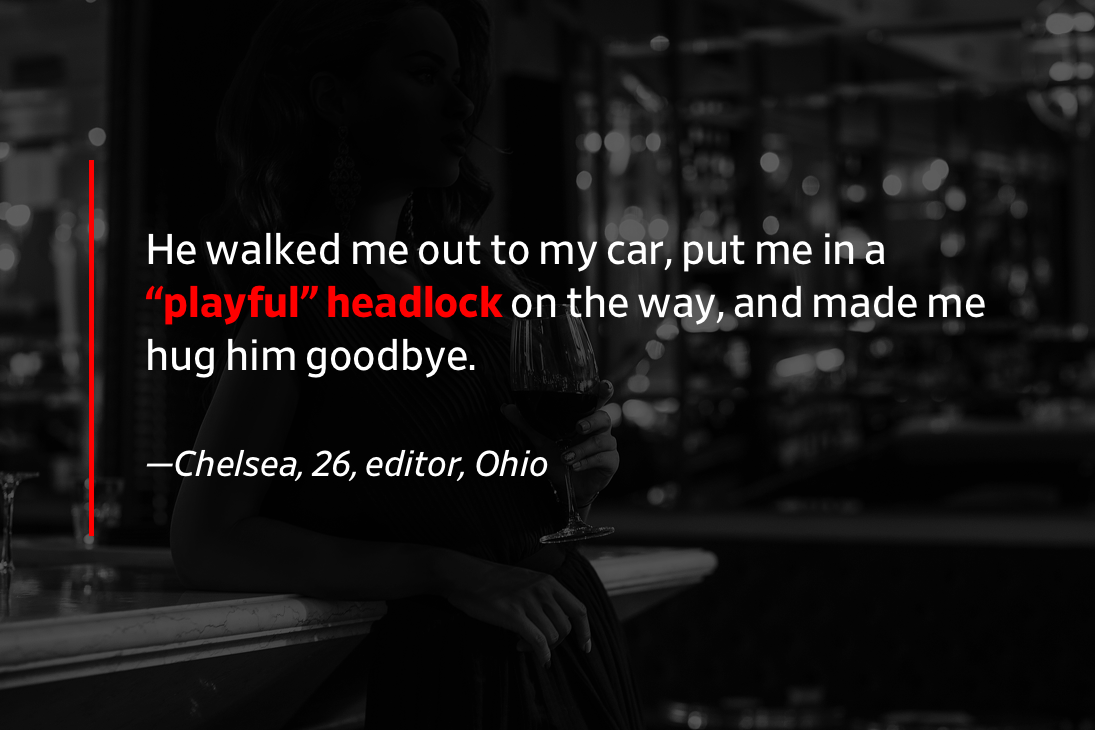
I went on a first date with a guy I met on Tinder, and he kept touching me—a little at first, things that seemed normal, like one of those playful hits on the shoulder, and it kept getting weirder, like when he put his hand on my lower back and touched my thigh. It ended with him walking me out to my car, putting me in a “playful” headlock on the way, and making me hug him goodbye and he wouldn’t let go. I jumped in my car and sped away as quickly as I could and didn’t process how weird it all was until halfway home when I just started crying. —Chelsea, 26, editor, Ohio
I was in a long-distance relationship at age 21 and went to visit my girlfriend for a long weekend after several months apart. When I arrived, she was warm and caring as usual and wanted me to sleep in her bed with her but suddenly not interested in having sex. I was confused and extremely disappointed, and on the second night, I was so horny in bed with her that I told her that if she didn’t want to have sex that was her decision but that I really needed to jerk off. She reluctantly agreed that was OK, but after I put on some porn and started, I wanted her even more and begged her to have sex. She finally said OK. During intercourse, she was visibly sad and at one point started crying. I asked if I should stop, but she weepily told me it was OK to keep going, and I finished. When the trip was over, we broke up. About a year later when learning about sexual harassment for a job, I came to terms with the fact that the way I pressured her and continued when she was clearly not enjoying it was harassment. —Roger, 29, lawyer, D.C.
In Public Spaces

Since the invention of streets, women have debated how we should feel about street harassment. Some people enjoy the phantom adulation screamed at them from across the block; others wish men would stop making unsolicited assessments of their bodies. The stories in this category explore women’s desires to draw a line between objectifying or threatening harassment and harmless, or at least harm-lite, compliments.
Describe a situation that was in a gray area but ultimately OK.
I was in London. As I crossed a street, I noticed a man noticing me. He smiled at me—but it seemed more a smile of recognition rather than a sleazy smile. He walked to his car, threw his gym gear in the boot, and got in his car. I continued walking. Within a few minutes, the guy in the car came around the corner. As he drove by, he had his window down, and he called out, “You’re really very beautiful.” I wasn’t sure how I should have felt. I was taken aback. When I thought about it, though, I think it was probably OK. He didn’t curb-crawl. He didn’t wait for me around the corner. He didn’t try to engage me in conversation when we were both on the footpath. He didn’t say anything offensive. He—essentially—paid me a compliment. —Hazel, 44, writer and Ph.D. candidate, Dublin
I’m a heavily tattooed woman, and … sometimes it’s hard to even go to the grocery store without someone asking me a question about my skin. I understand that it might seem friendly to strike up a conversation about tattoos, but it also doesn’t feel good to have strange men alert me to the fact that they’re interested in my legs or looking at my chest. Probably my least favorite is when men ask to look at my tattoos, which usually means they want me to stand still for them to ogle or that they want me to lift part of my clothing to reveal more skin. … However, if it’s another heavily tattooed person and they make a small comment, such as complimenting the art or asking who the artist is, that ultimately feels OK. —Hannah, 30, animal rescuer, D.C.
“Great outfit!” or other mention of attire, either low-cut or not. I do believe that people ought to lighten up a bit when folks give compliments or slightly off-color jokes, and they take offense. This world is too uptight as it is without intentionally interpreting every compliment as having sexual overtones! My definition of harassment is something that makes the listener uncomfortable, whether sexual or not. If I am not uncomfortable with the remark or wink or whatever, I do not think of that as harassment! —Joyce, 74, university professor, New Haven, Connecticut
Man I pass on my pedestrian commute every day says, “Good morning. What a beautiful smile you have! Have a great day.” Every day he says this and I don’t find it menacing or inappropriate. —Kate, 38, nurse, Philadelphia
Describe a situation that was in a gray area but ultimately not OK.
I used to live in Belfast, Northern Ireland, and went to pubs quite frequently. I can’t remember a Saturday night where going up to the bar to get a drink did not include getting my ass grabbed or boob tweaked (or on one particularly disgusting occasion, gotten my ear licked). This is considered the price women pay to drink in public, and we all dealt with it. It was termed “a bit of banter” and did not matter how I was dressed. —Kristen, 34, chief operating officer, Philadelphia
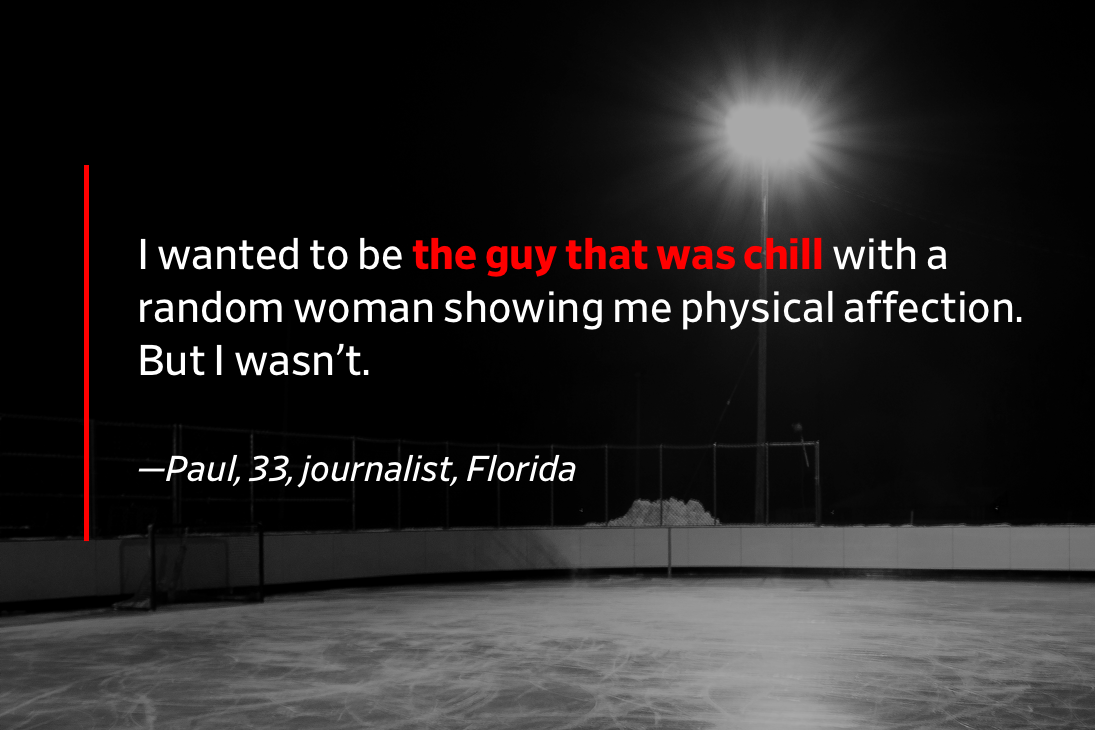
Describe a situation that seemed OK at the time but now seems like harassment.
In my latter teen years I was at a skate rink with a friend, and some girl I had met maybe an hour before came up behind me and did the hug-from-behind thing and whispered stuff in my ear. I think she may have kissed me in the cheek too. I remember being very uncomfortable with this, but also I didn’t want to make her feel rejected or undesirable. I put on a brave face at first. I wanted to be the guy who was chill with a random woman showing me physical affection. But I wasn’t. —Paul, 33, journalist, Florida
A man at grocery store comments on cuteness of my infant baby boy and asks if he’s my first. I tell him I have a preschool boy also. He says, “You know what they call moms who have boys? Red hot mamas.” —Kate, 38, nurse, Philadelphia
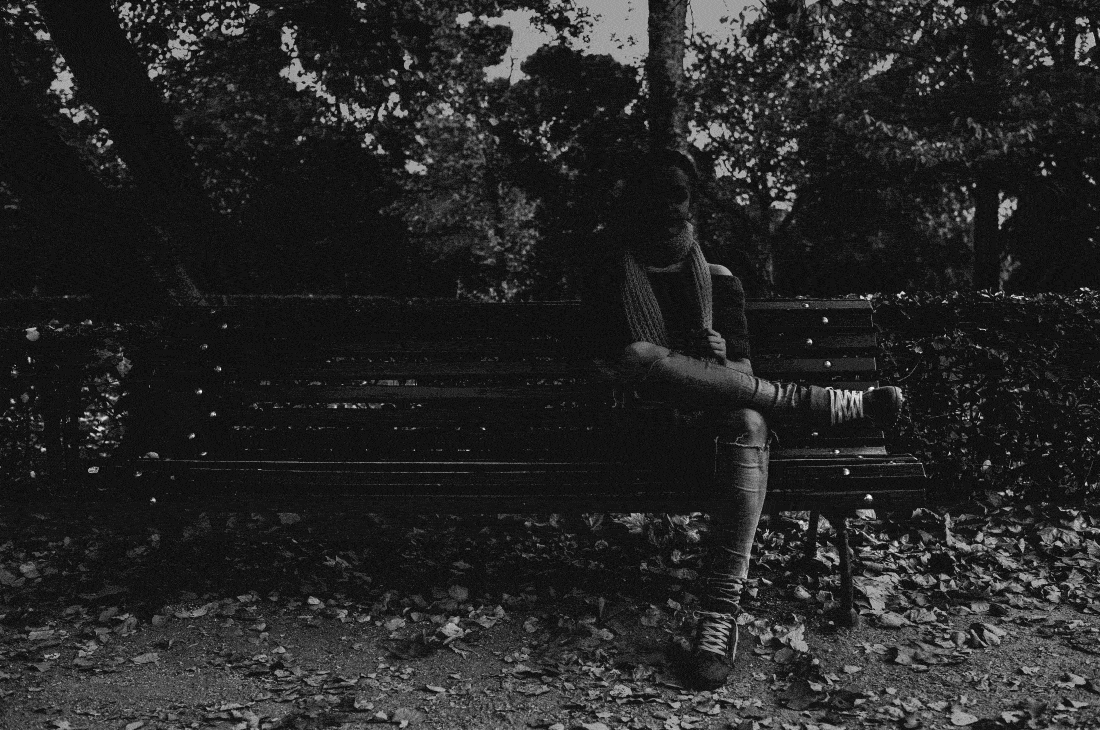
With Friends
Because friendships foster intimacy, harassment can persist under the guise of playful ribbing or buddy-chats about sex. Because friendships foster forgiveness, targets are often inclined to give perpetrators the benefit of the doubt. And when one party to a friendship wants to make the relationship sexual, existing bonds may mute consent-seeking alarms that would go off in an encounter with a stranger. These anecdotes clarify some internal struggles friends face when their ideas of appropriate boundaries conflict.
Describe a situation that was in a gray area but ultimately OK.
[As a teenager,] a close friend told me that he often enjoyed masturbation. We talked about what it would feel like to have someone else jack us off and agreed that we would try it even though we didn’t find each other attractive. One night we took turns. After a few minutes of this I told him that I wasn’t comfortable with it and that I wanted to stop. He agreed, and we never considered that possibility again. —Roy, 28, musician/activist, Salt Lake City
I’ve had groups of friends who were very free to surprise-share their genitals with me and each other. At the time I grimaced but laughed it off. There was something about it that gave me a sense of intimacy with them, like I was in the club and it was cool, it made me tough. Eventually their immaturity got to me, and I moved on to better friends, but I wonder if I should have “dumped” them sooner due to this. I wouldn’t condone this behavior happening to me now. But it didn’t really bother me too much at the time, and I still don’t feel like it was really that bad. —Colleen, 38, artist, California
Describe a situation that was in a gray area but ultimately not OK.
I was driving in a car with a friend from high school (we were in college at the time). He pulled over into an empty parking lot late at night and began to feel me up out of the blue. I told him I did not want to do anything with him, and he tried to convince me for a bit before backing off and driving me home. He made me feel extremely on edge, and I kept my phone at the ready the whole ride home in case he changed his mind. I gave him a kiss when he dropped me off because I felt horrible and like I had to please him somehow (we had never had any sort of romantic relationship prior to this). Sometimes I wonder if my fear was dramatic or unnecessary given that he stopped. But another part of me says that he shouldn’t have pulled into a dark, empty parking lot, feeling me up without checking to see if I was interested. —Sharon, 24, assistant, New York
I was at a party with a friend who pulled my bra strap down to my elbow in front of another man, and it felt like a lesson plan for this other man’s benefit. I had long wanted to sleep with this friend, so my response was muted. —Molly, 31, microbiologist, Colorado
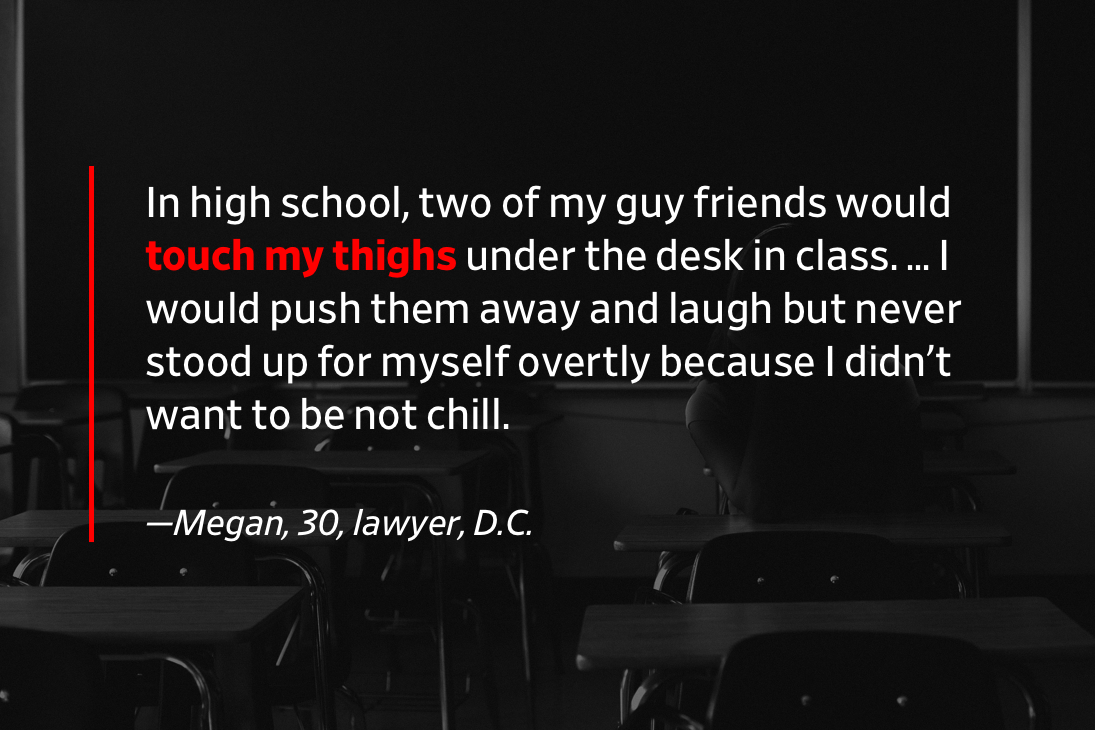
Describe a situation that seemed OK at the time but now seems like harassment.
I’m a queer woman, and when I was in college, I used to make out on occasion with one of my gay male friends. I think we both found each other attractive but obviously weren’t into each other romantically. One night, we were drunk at a party and snuck into someone’s bedroom to make out. I remember asking him several times to have sex with me while we were making out, and he said no every time. I think I felt like, If I could just seduce him enough, he’ll have sex with me. I should have taken him at his word. At the time, it felt like we were just playing around, and since he was a lot bigger than me and a dude, I felt like he still had the power in the situation. Now, I feel horrible, like I harassed him. —Natasha, 29, journalist, D.C.
One co-worker and friend of mine made me feel very weird when he kept telling me about the sexual details of his marriage, and also when he sent me a bunch of pictures he’d taken at Burning Man without giving me a heads up that there were TONS of shots that were literally just close-ups of his penis. —Yosia, 31, business owner and writer, California
In high school, two of my guy friends would touch my thighs under the desk in class. It was like a joke we were all in on, but it made me vaguely uncomfortable. I would push them away and laugh but never stood up for myself overtly because I didn’t want to be not chill. —Megan, 30, lawyer, D.C.

Elsewhere
No matter where harassment takes place, power dynamics play a major role in how it’s perceived. A doctor, professor, or older family friend generally has a greater responsibility to police the appropriateness of his own behavior than a patient, student, or teenager. But if the person in a position of power respectfully accepts a rejection of his advance, is it still harassment? When the power dynamics are less clear—as with a developmentally disabled man who wants to hug a nonconsenting woman—targets may wonder about the appropriate response.
Describe a situation that was in a gray area but ultimately OK.
One time, when visiting my grad school adviser in his office, I was wearing a fairly low-cut dress. I was also wearing feather earrings (so very light), one of which had fallen out of my ear while I was sitting in his office and landed between my breasts. After several minutes of conversation, he asked me somewhat awkwardly after a lot of shifting glances, “Why is that there?” while looking at the fallen earring—and thus my cleavage. —Lindsay, 35, higher education, Wisconsin
I was about 15 or 16. A family friend, a professor in his 50s who lived in an apartment in a college dorm as a resident faculty resource for the students, let me come and whine my teenage anxieties, pouring me wine and maybe sharing some marijuana. He made a pass at me a couple of times. I said no. He continued to be a gentleman and a family friend. Later I learned that this was his regular M.O., so I assume college boys in crises probably fell into his net. I have no idea how they fared, but I hope he was good to them. —David, 60, law, San Francisco
Describe a situation that was in a gray area but ultimately not OK.
A man at my local church apparently likes to greet people by giving hugs. I don’t like physical contact like that with strangers and tried to get by with a handshake. He may have had a developmental disability, but I felt completely alone in rejecting this unwanted attention. —Julia, 30, administrative professional, Philadelphia
I graduated from drama school recently. As the culmination of two years of hard work, we put on a full-scale theatrical production. I played a sex worker, a young woman who was a victim of human trafficking. At one point during rehearsals, our director became angry with me for not sexing the part up enough. In the scene, this woman was asking a doctor for help, but a language barrier made some amount of physical storytelling necessary. The director became frustrated and in front of my scene partner and the stage manager said I should just grab my breasts and gestured the way in which he thought I should shove my breasts up into my face. He accused me of being afraid to go there, treated me like a bad actor, and acted as though I was just being difficult because I insisted that was wrong for the character and unnecessary. —C., 25, actor, New York
A college professor took his students out to a local bar several times during the semester (all age 21-plus). He would sit next to me at the bar and make comments like, “You’re different than other students. You’re more mature.” … It always felt creepy. —Kate, 38, nurse, Philadelphia
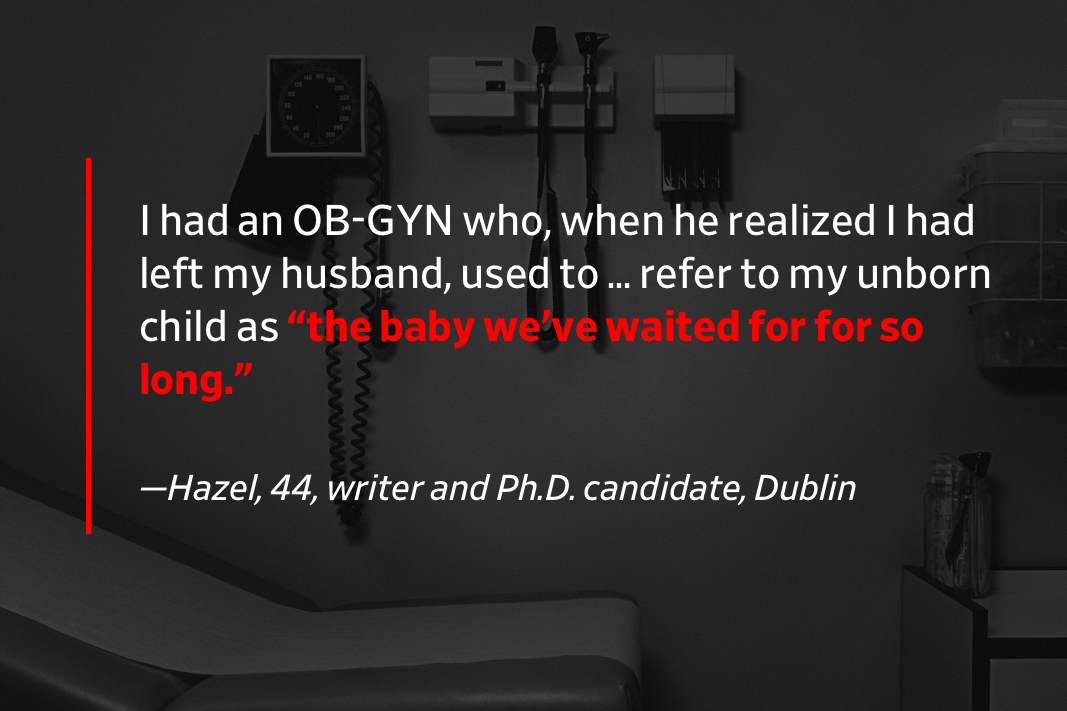
Describe a situation that seemed OK at the time but now seems like harassment.
Having my butt grabbed or my boobs honked by someone whose sexual orientation excludes me as a love interest. —Molly, 31, microbiologist, Colorado
Years ago, I had an OB-GYN who, when he realized I had left my husband, used to kiss me every time I went to his office, hold my hand across his desk, refer to my unborn child as “the baby we’ve waited for for so long,” and call me pet names. I thought my discomfort was unreasonable; there was usually a nurse in the room, so I thought if it was unprofessional, they would have reacted. —Hazel, 44, writer and Ph.D. candidate, Dublin
Back when I was 22 and about to graduate college, I was looking for a job in the nonprofit or government sector. There was a man I knew through my university fundraising work who ran a local foundation; I emailed him to ask if we could meet for a networking meeting where I could discuss what I wanted from my future career and maybe he could give me advice or job leads. We ended up having brunch, but he didn’t want to talk about my career. Instead he asked me prying personal questions about my dating life and implied that he wanted to date me. At the time, I thought I might have inadvertently made him think I was flirting with him and felt it was a misunderstanding that was my fault. —Jamie, 33, data scientist, Chicago